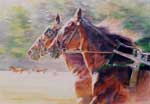Handicapping: The first step in successfully
picking a winner (or "handicapping") is becoming familiar with reading the racing program. Each program has a section explaining
the information format used at that particular track. Probably the best place to start when handicapping Standardbreds is
time. Since over 99 percent of all harness races are conducted at the one-mile distance, valid comparisons can be made among
horses.
Post Position: Generally, the closer
a horse starts to the inside rail or barrier of the track (especially on smaller tracks), the better is its chance of winning.
At the start, horses must either "leave" (start quickly) to get a good position or else find a place on the rail to avoid
racing on the outside of other horses. When racing on the outside the horse is said to be "parked out", and loses ground on
every turn. A horse on the inside has a better chance to get to the rail or quickly get a good position.
Driver: The top drivers at any track
have two big advantages in the sulky: (1) They usually are the best planners, knowing how to maximize the chances of their
horses by using shrewd racing tactics. and (2) They have an innate ability to keep a horse trying his best right to the finish.
The top drivers at each track are usually listed in the race program.
Consistency: A horse who has the
winning habit, either in terms of races won or money won, deserves extra consideration when trying to pick a winner. An inconsistent
performer, especially one who breaks stride often, can be risky.
Class: A horse which has raced adequately
against better foes may find his way into the winner's circle, while a horse who has beaten inferior foes may find tougher
horses not to its liking. A fairly reliable way of checking class is comparing the purses of the previous races and the present
race.
Sharpness: Horses are not machines,
and their abilities wax and wane. The alert fan can detect these changes in the racing program. A former classy horse who
shows a series of dull efforts may simply be worn out. Similarly, a horse at the peak of competitive sharpness may be able
to handle foes that he could only dream about in the recent past. Signs of a sharp horse include the ability to overcome racing
on the outside (a "parked-out" trip), a tough battle on the lead, and the making up of much ground in the stretch. The balancing
of "class" and "sharpness" is one of the keys to successful handicapping.
Win: The horse you select must come in first.
Place: The horse you select must come in first or second.
Show: The horse you select must come in first, second, or third.
Daily Double: A bet attempting to pick the winner of two consecutive races.
Pick Three: A bet attempting to select the winners of three consecutive races.
Perfecta or Exacta: A bet attempting to select the first two finishers in exact order.
Trifecta: A bet attempting to select the first three finishers in exact order.
Tri-Super: A bet attempting to select the first three finishers in exact order, and then the first four finishers
in exact order in a subsequent race.
Twin Trifecta: A bet attempting to select the first three finishers in exact order, and then the first three finishers
in exact order in a subsequent race.
Conditioned Race: A race where eligibility is based on age, sex, money won, or races won. For example, "3-year-old fillies,
non-winners of $10,000 or 4 races."
Claiming Race: A race where any of the entrants may be claimed (purchased) for a specified amount.
Invitational: A race for the top horses in the area. Also known a Open, Free-For-All, or the like.
Stakes Race: A race where owners make a series of payments, starting well in advance, to keep a horse eligible.
If an owner misses a payment to a stakes race, the horse becomes ineligible.
Early-Closer/Late-Closer:
A race requiring payments which start much closer to the actual race date than a
stake "Early" and "Late" involve specified periods of time.
Colt: A male three years of age or less.
Horse: A male four years of age or older.
Gelding: A castrated male of any age.
Filly: A female three years of age or less.
Mare: A female four years of age or more.

